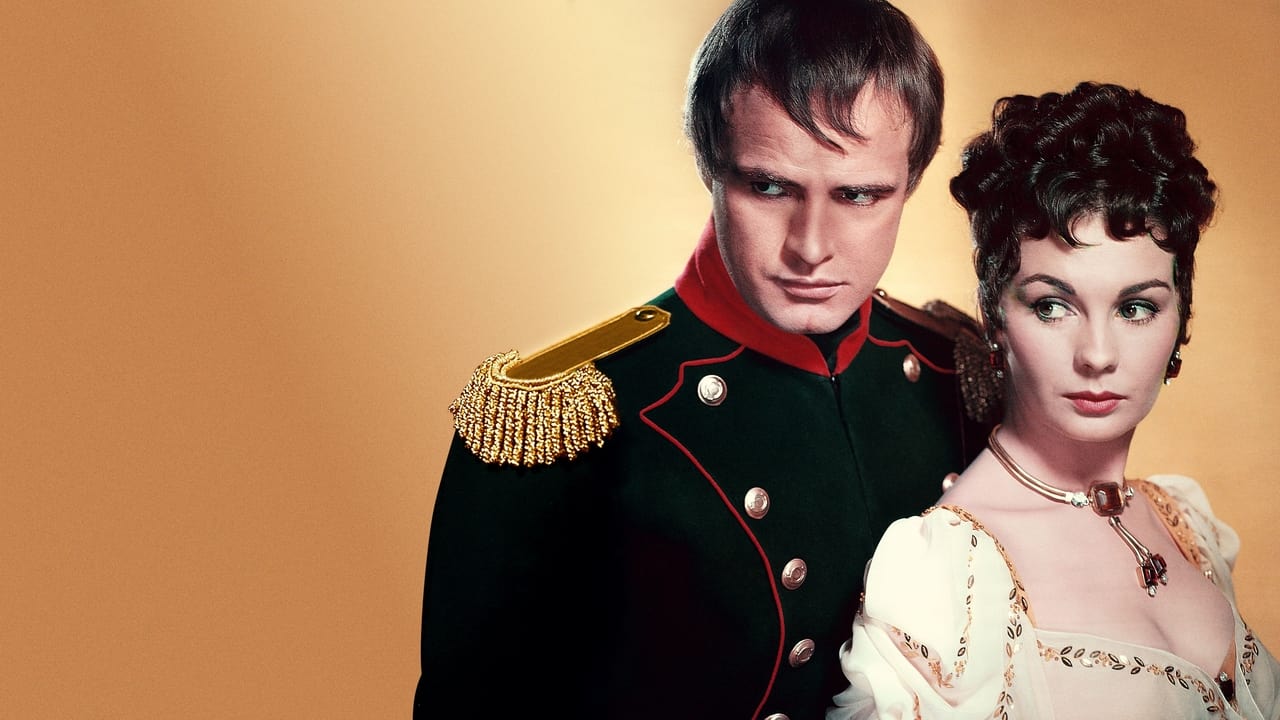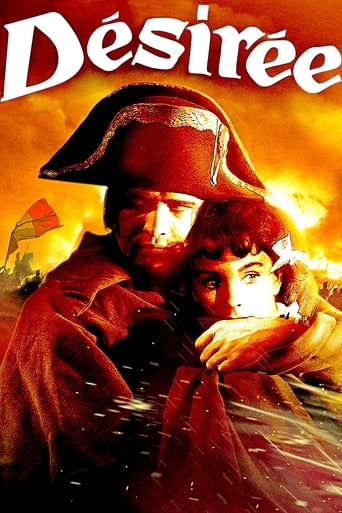

What a waste of my time!!!
... View MoreLack of good storyline.
... View MoreBest movie ever!
... View MoreIt's fun, it's light, [but] it has a hard time when its tries to get heavy.
... View MoreDesiree is, first and foremost, historical romance, not history and, as such, deserves to be cut some slack. Directed by the ever reliable Henry Koster, who one year earlier had helmed the movies' first Cinemascope production, "The Robe", it boasts a widescreen panoply of exquisite costumes, sumptuous sets, and gorgeous scenery guaranteed to give its customers an eyeful.The screenplay, written by Oscar winner Daniel Taradash (From Here to Eternity), which follows the title character's infatuation with a young Napoleon Bonaparte from the tail end of the French Revolution to her complete rejection of him after his Moscow defeat, is presented as a series of sporadic vignettes, which move slowly, sometimes tediously, toward its final conclusion. And yet, if you are able to accept the lack of action scenes and concentrate on the characters, the film can be highly enjoyable.Despite what the star billing implies, Marlon Brando's Napoleon is not the main player here (the story is seen almost exclusively from Desiree's point of view) but he is far and away the most interesting. Eschewing the great French military leader's putative habit of tucking his hand in his vest, he is nevertheless able to capture the essence of the man with true conviction. With low-key, well-articulated diction, he presents his Napoleon as a driven individual with a penetrating brain, tremendous powers of concentration, unflagging energy, and the ability to impose his will whenever it suits his needs. Less specifically, he suggests a man with high standards, noble ideals, a love of France, and a sense of honour. Assuredly a remarkable performance, as far from Stanley Kowalski ("A Streetcar Named Desire") as you can get.Desiree, as played by Jean Simmons, has more screen time than Napoleon, and that may be the picture's weakness. Her story, that of a young woman, first introduced as a maid working in the family textile shop, who becomes captivated by a young Napoleon (he initially wants to marry her for her dowry to finance his own military ambitions), is discarded by him, and, on the rebound, marries one of his generals to become queen of Sweden, is not particularly remarkable. Only when her path crosses Bonaparte's does the picture come to life. Yet Simmons, as always, fills her role beautifully with simplicity and charm. She was one of those young actresses of the '50s who could always be relied upon to bring her best to every part she played. Her long list of impressive credits (which includes Hamlet, The Robe, Guys and Dolls, Elmer Gantry and Spartacus) is enough to put today's one-hit-wonder Oscar winners to shame.The cast is rounded out by Michael Rennie as General Jean-Baptiste Bernadotte and Merle Oberon as the Empress Josephine. Both add dignity in their small, but decidedly secondary, roles.Despite the slow pacing, patient viewers will be rewarded with a terrific payoff in the film's final eight minutes. It is the touching, bittersweet scene during which Desiree and Napoleon meet for the last time and, while not historically accurate, it makes for great and moving drama. Napoleon has just recently escaped from Elba and is attempting to mobilize troops for one final effort to regain power in France. By now he is a humbled man, the confidence and swagger he so readily exhibited during his initial rise to prominence eroded. Yet, in retrospect, he is able to justify all his actions (In real life, he was a great administrator as well as a great military leader.), rightly or wrongly, and laments the betrayal of those he considered his closest friends. Though beaten, he still expects strict adherence to military protocol, as when he surrenders his sword ("Please don't hold it like an umbrella."). Desiree, though no longer enraptured by his charms, cannot help but feel a rekindling of admiration for him and a pang of regret.Marlon Brando reportedly once said that he took on the role of Napoleon for laughs. I very much doubt it. He is just too good. I think he was trying to get back at critics who refused to picture him as anyone other than Stanley Kowalski.
... View MoreI have noticed that several posters have commented on the "anti-feminist" aspects of this movie. I think they have missed the point in this particular movie. The whole point is that history is capricious - anything can happen. Even an admittedly-not-too-bright-with-no-ambitions-above-wife-and-mother woman can suddenly be caught up in world affairs and be loved by two of the great men of her time. And that's basically what happened, historically. Desiree had no ambition or desire to be what she became - a queen, and the founder of a dynasty that still exists today. Hence, her dialog. Feminist criticisms are beside the point.
... View MoreAt the same time he was making "On the Waterfront" Marlon Brando was appearing in this disaster of an historical epic, (so we know the bad movies didn't just come later). He's Napoleon, fat and camp, and he strides about the way Jay Robinson did in "The Robe". Jean Simmons is Desiree and he's mad about her but she seems to be getting in the way of his being a conqueror.Simmons looks lovely in full colour and her acting is muted and understated, (it always was), but she also looks uncomfortable as if she knows this movie isn't going to do much for her international career. As Josephine, Merle Oberon seems a size too big for her costumes and acts as if she seriously believes in what she's doing. She's terrible but she's probably the best thing about the movie. Still, it's entertaining in the way bad movies sometimes are.
... View MoreJean Simmons and Marlon Brando star in Desiree, the story of a young woman briefly involved with Napoleon. This is a sumptuous production to look at, but it's too long and extremely boring. Unlike some of the other posters, I was unimpressed with Marlon Brando's whispering Napoleon. I am a huge fan of Brando's and found his static portrayal a disappointment. He did, however, look like Napoleon, with the lock of hair over his forehead.I am also a huge fan of Jean Simmons but unfortunately, both of these actors were let down by the script and the incredibly plodding direction. Her character never really developed past girlhood. There was no chemistry between the two, and the story just meandered along. Michael Rennie as Bernadotte had little to do. The only standout was the beautiful Merle Oberon as the ousted Josephine. Also, historically, the film is inaccurate.Overall, pretty to look at, and a drag to watch.
... View More